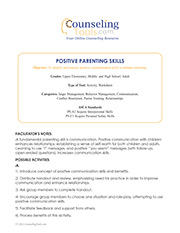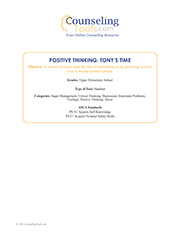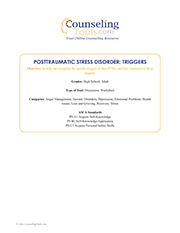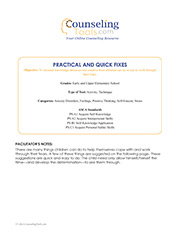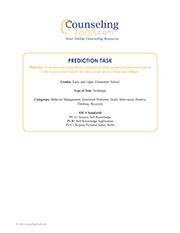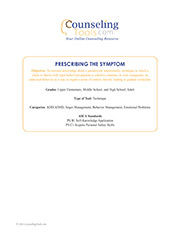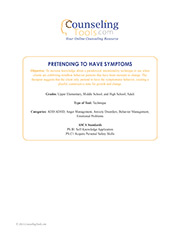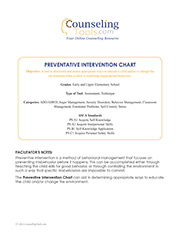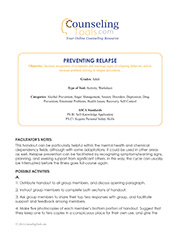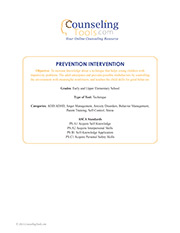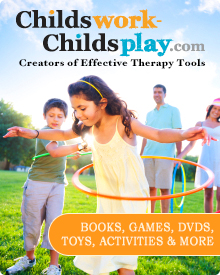-
-
TopicsAnger Management, Behavior Management, Communication, Conflict Resolution, Parent Training, Relationships
- Objective
To identify and practice positive communication skills to enhance parenting.
- Types of ToolsActivity, Worksheet
- GradesAdult, High School, Middle School, Upper Elementary School
- ASCA StandardsPS:A2 Acquire Interpersonal Skills, PS:C1 Acquire Personal Safety Skills
- Number of pages3
-
-
-
TopicsAnger Management, Critical Thinking, Depression, Emotional Problems, Feelings, Positive Thinking, Stress
- Objective
To increase awareness about the value of concentrating on the good things in life as a way to develop a positive attitude.
- Types of ToolsHandout
- GradesUpper Elementary School
- ASCA StandardsPS:A1: Acquire Self-Knowledge, PS:C1 Acquire Personal Safety Skills
- Number of pages4
-
-
-
TopicsAnger Management, Anxiety Disorders, Depression, Emotional Problems, Health Issues, Loss & Grieving, Recovery, Stress
- Objective
To help one recognize the specific triggers of their PTSD, and their responses to those triggers.
- Types of ToolsDiscussion, Worksheet
- GradesAdult, High School
- ASCA StandardsPS:A1: Acquire Self-Knowledge, PS:B1 Self-Knowledge Application, PS:C1 Acquire Personal Safety Skills
- Number of pages2
-
-
-
TopicsAnxiety Disorders, Feelings, Positive Thinking, Self-Esteem, Stress
- Objective
To increase knowledge about several creative fixes children can try to use to work through their fears.
- Types of ToolsActivity, Technique
- GradesEarly Elementary School, Upper Elementary School
- ASCA StandardsPS:A1: Acquire Self-Knowledge, PS:A2 Acquire Interpersonal Skills, PS:B1 Self-Knowledge Application, PS:C1 Acquire Personal Safety Skills
- Number of pages2
-
-
-
TopicsBehavior Management, Emotional Problems, Goals, Motivation, Positive Thinking, Recovery
- Objective
To increase knowledge about a technique in which paradoxical intention is used as a way to give control back to the child to make positive behavioral changes.
- Types of ToolsTechnique
- GradesEarly Elementary School, Upper Elementary School
- ASCA StandardsPS:A1: Acquire Self-Knowledge, PS:B1 Self-Knowledge Application, PS:C1 Acquire Personal Safety Skills
- Number of pages2
-
-
-
TopicsADD/ADHD, Anger Management, Behavior Management, Emotional Problems
- Objective
To increase knowledge about a paradoxical intentionality technique in which a client or family with rigid behavioral patterns is asked to continue, or even exaggerate, an undesired behavior as a way to regain a sense of control, thereby leading to gradual extinction.
- Types of ToolsTechnique
- GradesAdult, High School, Middle School, Upper Elementary School
- ASCA StandardsPS:B1 Self-Knowledge Application, PS:C1 Acquire Personal Safety Skills
- Number of pages3
-
-
-
TopicsADD/ADHD, Anger Management, Anxiety Disorders, Behavior Management, Emotional Problems
- Objective
To increase knowledge about a paradoxical intentionality technique to use when clients are exhibiting mindless behavior patterns that have been resistant to change. The therapist suggests that the client only pretend to have the symptomatic behavior, creating a playful, constructive tone for growth and change.
- Types of ToolsTechnique
- GradesAdult, High School, Middle School, Upper Elementary School
- ASCA StandardsPS:B1 Self-Knowledge Application, PS:C1 Acquire Personal Safety Skills
- Number of pages3
-
-
-
TopicsADD/ADHD, Anger Management, Anxiety Disorders, Behavior Management, Classroom Issues, Emotional Problems, Self-Control, Stress
- Objective
A tool to document and assess appropriate ways to educate a child and/or to change the environment when a child is exhibiting inappropriate behaviors.
- Types of ToolsAssessment, Worksheet
- GradesEarly Elementary School, Upper Elementary School
- ASCA StandardsPS:A1: Acquire Self-Knowledge, PS:A2 Acquire Interpersonal Skills, PS:B1 Self-Knowledge Application, PS:C1 Acquire Personal Safety Skills
- Number of pages2
-
-
-
TopicsAlcohol and Drug Prevention, Anger Management, Anxiety Disorders, Depression, Health Issues, Recovery, Self-Control
- Objective
Increase recognition of symptoms and warnings signs of relapsing behavior, and to increase problem-solving in relapse prevention.
- Types of ToolsActivity, Worksheet
- GradesAdult
- ASCA StandardsPS:B1 Self-Knowledge Application, PS:C1 Acquire Personal Safety Skills
- Number of pages3
-
-
-
TopicsADD/ADHD, Anger Management, Anxiety Disorders, Behavior Management, Parent Training, Self-Control, Stress
- Objective
To increase knowledge about a technique that helps young children with impulsivity problems. The adult anticipates and prevents possible misbehaviors by controlling the environment with meaningful reinforcers, and teaches the child skills for good behavior.
- Types of ToolsTechnique
- GradesEarly Elementary School, Upper Elementary School
- ASCA StandardsPS:A1: Acquire Self-Knowledge, PS:A2 Acquire Interpersonal Skills, PS:B1 Self-Knowledge Application, PS:C1 Acquire Personal Safety Skills
- Number of pages3
-
- Home
- Topics
- ADD/ADHD
- Adoption
- Alcohol and Drug Prevention
- Anger Management
- Anxiety Disorders
- Asperger's Syndrome
- Assertiveness
- Autism Spectrum
- Behavior Management
- Body Image
- Bullying and Cyberbullying
- Career Exploration
- Character Education
- Classroom Issues
- Cliques
- Communication
- Types of Tools
- Grades
- ASCA Standards
- A:A1 Improve Academic Self-Concept
- A:A2 Acquire Skills for Improving Learning
- A:A3 Achieve School Success
- A:B1 Improve Learning
- A:B2 Plan to Achieve Goals
- A:C1 Relate School to Life Experiences
- C:A1 Develop Career Awareness
- C:A2 Develop Employment Readiness
- C:B1 Acquire Career Information
- C:B2 Identify Career Goals
- C:C1 Acquire Knowledge to Achieve Career Goals
- PS:A1: Acquire Self-Knowledge
- PS:A2 Acquire Interpersonal Skills
- PS:B1 Self-Knowledge Application
- PS:C1 Acquire Personal Safety Skills
- About Us
- Contact Us


 Post Forms here
Post Forms here
